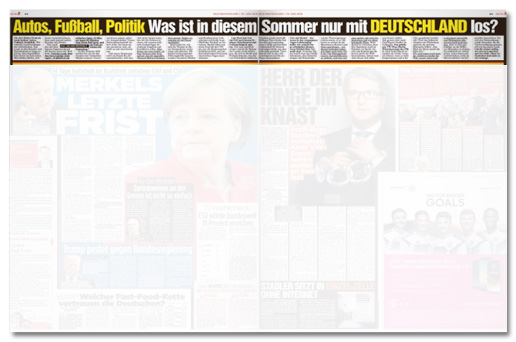“Bild”-Chef Julian Reichelt hat sich am Dienstag in einer Art Leitartikel an eine große Frage gewagt:
Die “drei Säulen Deutschlands” seien: Autos, Fußball und Stabilität. Und nun das: Autobosse landen im Knast. Die deutsche Fußballnationalmannschaft wirke bei der Weltmeisterschaft in Russland “zu satt zum Gewinnen”. Und unsere Regierung …
Und unsere Regierung steht am Rande des Zusammenbruchs, weil man sich nicht einigen kann, wie wir die Grenzen sichern, die unseren weltweit einzigartigen Sozialstaat umgeben und beschützen sollen. Man könne nur eines haben, offene Grenzen oder Sozialstaat, hat der legendäre Ökonom Milton Friedman dazu gesagt. Beides zusammen sei auf Dauer unmöglich.
Ein Wirtschaftsnobelpreisträger (also: Friedman, nicht Reichelt), der uns vor die Wahl stellt: offene Grenzen oder Sozialstaat? Wer würde sich da schon für offene Grenzen und gegen “unseren weltweit einzigartigen Sozialstaat” entscheiden? Julian Reichelt wohl nicht. Ein anderer vermutlich aber schon: Milton Friedman.
Der Ökonom hat bei verschiedenen Gelegenheit über die angebliche Unvereinbarkeit von Sozialstaat und offenen Grenzen gesprochen; immer in leicht anderer Form (mal: “It’s just obviuos that you can’t have free immigration and a welfare state”, mal: “It is one thing to have free immigration to jobs. It is another thing to have free immigration to welfare. And you cannot have both.”), im Kern aber stets mit derselben Aussage. Das Zitat wird gern als Argument gegen offene Grenzen und gegen illegale Migration angeführt. Dabei war Friedman vor allem gegen eins: den Sozialstaat. In seinem Werk “Chancen, die ich meine” schrieb er, dass der “welfare state” einer der größten Feinde der Wirtschaft sei.
Illegale Migration hingegen könnte unter bestimmten Voraussetzungen für alle etwas Gutes haben, so Friedman. In einem Vortrag vor Studenten sagte er:
Why is it that free immigration was a good thing before 1914 and free immigration is a bad thing today? […] There’s a sense in which free immigration, in the same sense as we had it before 1914 is not possible today. Why not?
Because it is one thing to have free immigration to jobs. It is another thing to have free immigration to welfare. And you cannot have both. If you have a welfare state, if you have a state in which every resident is promised a certain minimal level of income, or a minimum level of subsistence, regardless of whether he works or not, produces it or not, then it really is an impossible thing. […]
Nobody would come unless he or his family thought he would do better here than he would elsewhere. And, the new immigrants provided additional resources, provided additional possibilities for the people already here. So everybody can mutually benefit. […]
Look, for example, at the obvious, immediate, practical case of illegal Mexican immigration. Now, that Mexican immigration over the border is a good thing. It’s a good thing for the illegal immigrants. It’s a good thing for the United States. It’s a good thing for the citizens of the country. But it’s only good so long as it’s illegal.
That’s an interesting paradox to think about. Make it legal and it’s no good. Why? Because as long as it’s illegal the people who come in do not qualify for welfare, they don’t qualify for social security, they don’t qualify for all the other myriads of benefits we pour out from our left pocket to our right pocket. So long as they don’t qualify they migrate to jobs. They take jobs that most residents of this country are unwilling to take. They provide employers with workers of a kind that they cannot get. They’re hard workers, they’re good workers, and they are clearly better off.
Für diesen ganzen Kontext war in “Bild” leider kein Platz.

